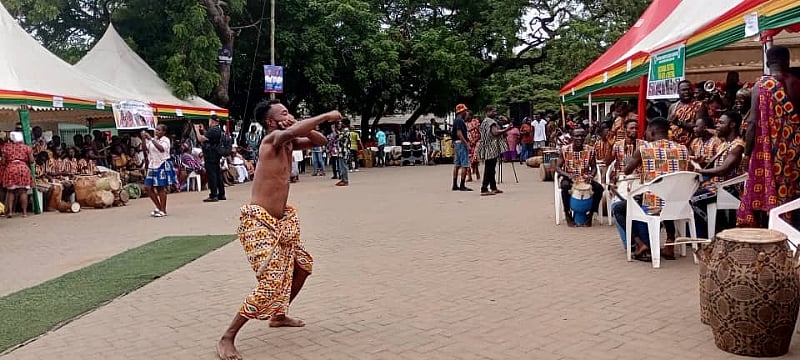The Accra Regional Festival of Arts and Culture (REFAC), organized by the Centre for National Culture (CNC) Greater Accra, recently took place at the Arts Centre in Accra. The festival highlighted the urgency for collaboration among stakeholders, including government bodies, traditional authorities, cultural leaders, and citizens, to safeguard Ghana’s cultural assets. This alignment is crucial for ensuring that future generations inherit a legacy rich in cultural pride and innovation. REFAC served as a countdown to the 62nd National Festival of Arts and Culture (NAFAC), scheduled for October 25–31 in Techiman, which aims to foster engagement among stakeholders in the arts and cultural sectors, promote creativity, and underscore Ghana’s rich heritage. The overarching goal is to fortify national identity and instill a sense of pride in the nation’s cultural uniqueness.
The festival showcased the cultural creativity of Greater Accra, where all 29 Metropolitan, Municipal, and District Assemblies (MMDAs) presented an array of arts and crafts. Adding to the vibrancy of the event was a regional beauty pageant, where the winners from Ga East and Ga North were designated to represent the Greater Accra region at NAFAC. Traditional performances, including drumming and dancing, emphasized the rich Ga cultural roots, leading the Accra Metropolitan Assembly to victory in the cultural performance competition. The emphasis on traditional forms of expression and competition not only celebrated local talent but also encouraged communal participation in cultural activities.
Nana Otuo Owoahene Acheampong, Executive Director of the National Commission on Culture, emphasized the necessity of integrating culture into everyday life and national development rather than relegating it to festivals alone. He articulated how REFAC is a celebration of Ghanaian values, history, and identity, alluding to the critical role culture plays in nurturing democracy and driving societal advancement. Looking ahead to NAFAC’s 62nd anniversary, Acheampong pressed for a focus on utilizing Ghana’s cultural practices to foster unity, social cohesion, and sustainable development—especially relevant as the country prepares for the December 7 elections. He highlighted that REFAC transcends entertainment, serving as a platform for talent development, tourism promotion, and job creation.
In his address, Mr. Eric Ohene-Larbi, the Greater Accra Regional Director for CNC, called on artists, policymakers, and educators to consider culture as fundamental to democracy and sustainable growth. He pointed out that the path to sustainable development necessitates an acknowledgment of cultural heritage’s significant contributions. Ohene-Larbi also stressed the potential of the creative sector to generate employment and invigorate local economies, positing that investment in cultural industries can significantly propel economic advancements. Furthermore, REFAC and NAFAC are seen as vital avenues for fostering dialogue, creativity, and community unity in the context of Ghana’s diverse societal fabric.
Madam Georgina Opoku, Ghana’s Cultural Ambassador and CEO of Asor Body Works, urged Ghanaians to deepen their cultural connections through the embrace of local dishes, drinks, attire, and languages. She posited that appreciating and valuing local cuisine not only enhances personal health but also strengthens the cultural heritage that defines the Ghanaian identity. This call to action reinforces the idea that cultural appreciation can have far-reaching benefits, encompassing health, economic vitality, and a robust sense of community among the various ethnic groups in the nation.
In his closing remarks, Nii Kwabena Bonne V, Osu Alata Mantse and chairman of the occasion, accentuated the significance of reconnecting with cultural roots as a means to foster societal unity. He encouraged all ethnic groups to take pride in their traditions, underscoring the need to focus on cultural components in every aspect of societal life. Reflecting on the successful conduct of competitions and contests, he emphasized that recognition in these areas contributes to the greater cultural dialogue in Ghana. Certificates awarded to regional winners further reaffirmed that such initiatives not only celebrate artistic achievement but also contribute to understanding and appreciating the diverse cultural tapestry of the nation.














